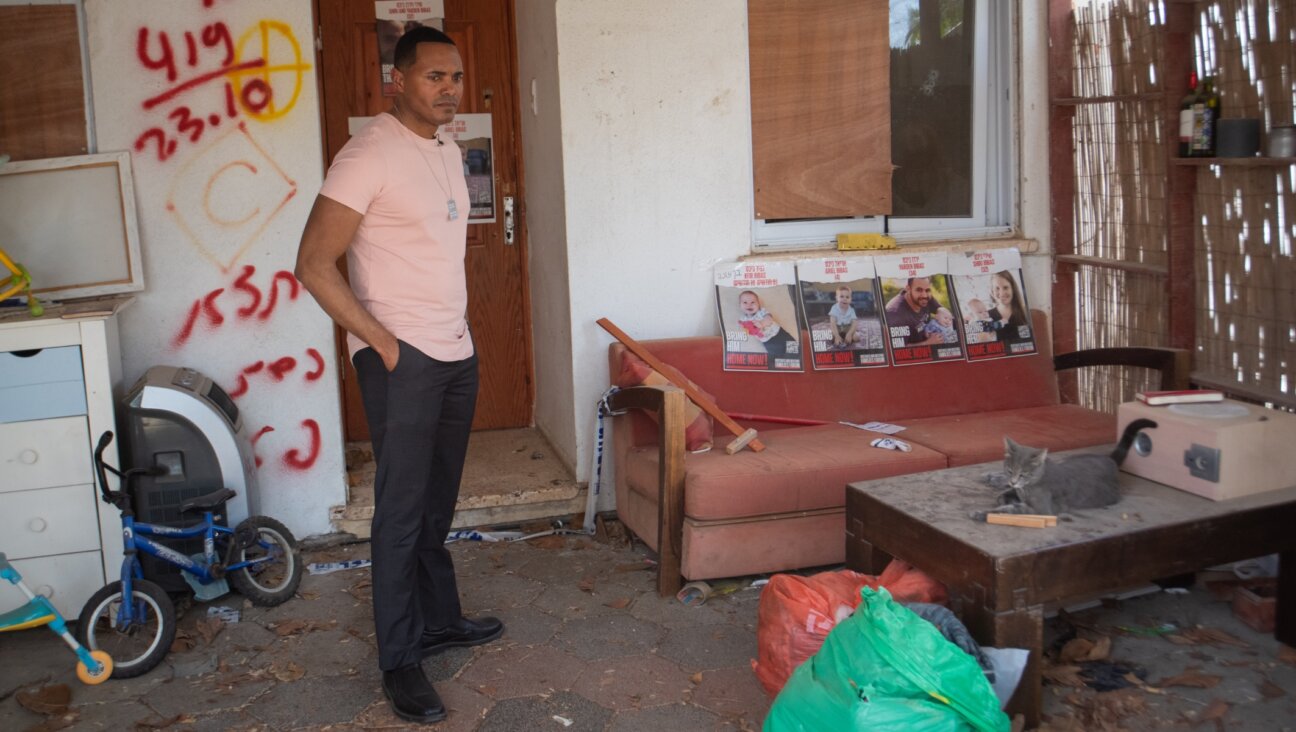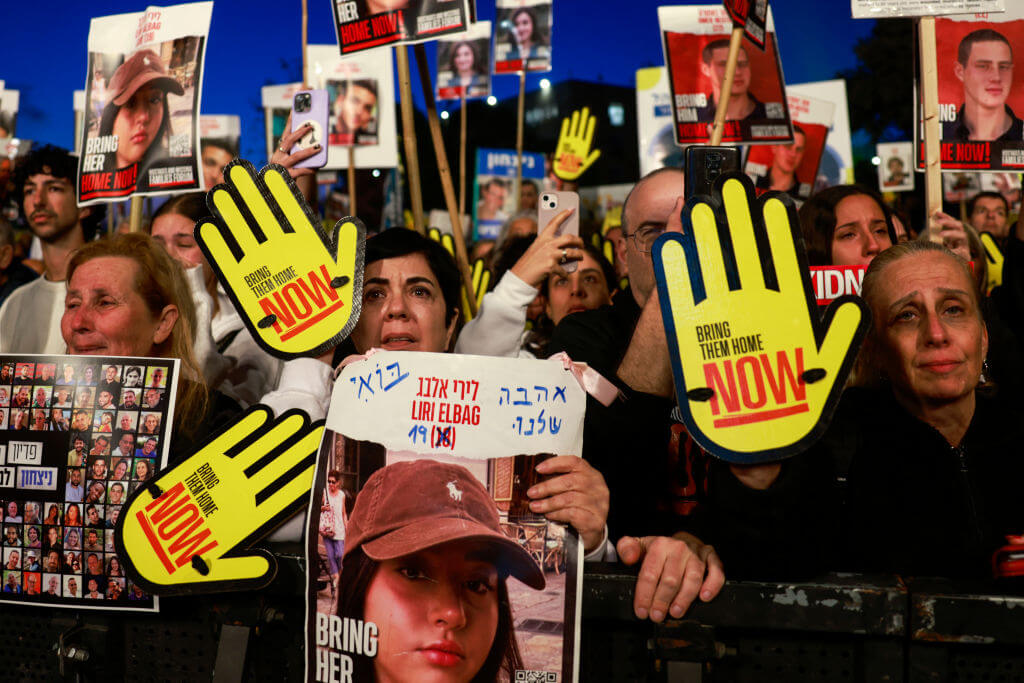A Time To Teach

Poolside: Sarah Wildman and her daughter, Orli, play in the water during a recent outing. Image by COURTESY OF SARAH WILDMAN
The Talmud tells us to teach our children to swim, I mused to my father as we watched a 3-year-old toddler melt down in hysterics while refusing to enter a hotel pool. (Granted, every kid has his bad days.)
My parents were in town visiting my 17-month-old daughter, Orli, and me; my partner, Ian, was out of town.
As is always the case, the visit was too fast and not fast enough, fantastic and frustrating. In other words: a good time. My mother had booked a hotel not far from our apartment. Summer in Washington, D.C., started early this year and, though it has been fierce from the outset, I pooh-poohed the idea of hours with Orli anywhere, let alone in water.
But I could barely tear her away from the pool. Orli insisted on attempting to swim: jumping and paddling, remaining immersed until our collective fingertips had long-since withered and her lips had turned from pink to periwinkle.
“When do I teach her to swim?” I wondered aloud to my parents. “How do we know the right time to teach anything?” Of course, the Talmud’s lesson on swimming is literal — teaching someone to swim can save his or her life. But could we, I wondered, think of “swim” as swimming in life — in other words, as tools to live by? Bits of knowledge we’d like our kids to have?
The last time I was at my parents’ house, it was just before Shavuot. My father was scheduled to read the haftorah in synagogue during the holiday. Briefly, because we’d arrived very late at night, he went into an exegesis of the parsha. He was mildly worried, because while he knows the parsha for the holiday nearly by memory, the haftorah would require some studying.
This is something I’ve always admired about him and taken for granted. At shul, my father will sometimes lean over to me and say, “Do you see this translation? Don’t you think it’s odd they chose to translate it that way?” He will then explain the nuance of a verb construction in biblical Hebrew that, invariably, I have not noticed. He’ll often have several texts with him, in addition to a tikkun (book of Torah commentary) and a siddur (prayer book). Usually, it is some modern commentary, though sometimes it is a pamphlet picked up during some long-ago bar mitzvah that he thought was particularly insightful. My father still takes Talmud classes each Tuesday, and sometimes it is the insights from a class that he whispers to us during davening or later at night in the kitchen.
When I was a child, my father led the junior congregation at my synagogue. Envisioning a vibrant community of children clamoring for knowledge, he would prepare endlessly for sermons and Torah portions, lessons taught and advice imparted. Sadly, it was mostly for naught. Talmud Torah in 1980s suburban New Jersey did not have the same verve and enthusiasm as it did in 1950s Western Massachusetts, where my dad grew up with a refugee father.
In my father’s childhood, Jewish kids, at least in the Aggadah of my family, were vibrant scholars from an early age. Isolated, as the town had few Jews, they became fervent students, eager Torah readers and joyful congregants. And then, during summertime at Camp Ramah, kids actually conversed in Hebrew. My father likes to recall a table-tennis game with soon-to-be-Talmud scholar Baruch Bokser where the words “I won” were debated as vigorously as the points lost.
“He said ‘zachiti,’” in Hebrew, my father says; he tells this story often. “Meaning ‘I merited.’ Zechut Avot (Merit of the Fathers). You ask for Zechut Avot because Abraham, Isaac and Jacob were such devoted followers that God should have mercy on their offspring; it’s merited. So ‘zachiti’ means, ‘I merited.’ The tennis courts were in [bad] shape and the ping-pong table was right outside our door in 1961. So we played ping-pong all the time.”
In any case, at junior congregation, I was his sidekick, a goody-two-shoes determined to show my day-school cousins that I knew as much Hebrew as they and could read Torah just as well. Each week, I learned an aliyah, beginning about the time I turned 10, listening at night to my father singing into cassette tapes, memorizing the lines with a tikkun blessed with vowels. Invariably, the night before attending shul, we would have a massive fight, with me insisting that I had gotten it mostly right, and therefore right enough, and my father trying to persuade me that mostly right wasn’t right.
I took it for granted that he could make me the tapes — that he could break down the parsha for me, teach me what it meant, not just what it said, explain the context as well as the conversation, and meander a bit about the Hebrew and the etymology of the words.
But in the years since college, I have done little studying on my own, Jewishly. I do not take Talmud class, I haven’t read Torah in ages — for the aufruf (aliyah) before my wedding, I read the haftorah. But my father made me a tape to remind me of the trope.
What will I teach Orli? I worry about this late at night sometimes, or when I am at my parents’ home. I have the Hebrew, more or less, but not the breadth of knowledge.
I was a swim instructor at Camp Ramah in the early and mid-1990s — tzevet mayim (swim staff). I can teach her to swim. But Torah? The Talmud also counsels mothers to teach Torah. Is it too late to become a student in time to be her teacher?
Sarah Wildman writes about the intersection of culture, politics and travel for the New York Times and Politics Daily. She is the 2010 recipient of the Peter R. Weitz Journalism Prize for excellence and originality in reporting on Europe and the trans-Atlantic relationship for her writing in Slate.























